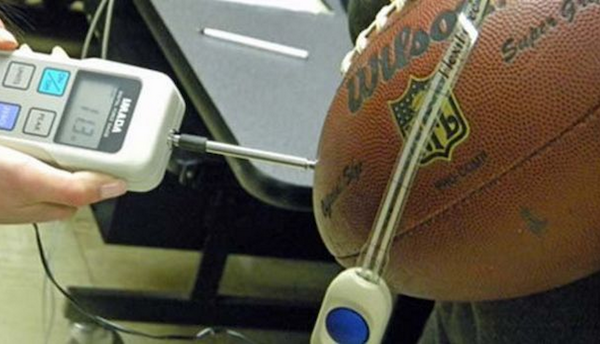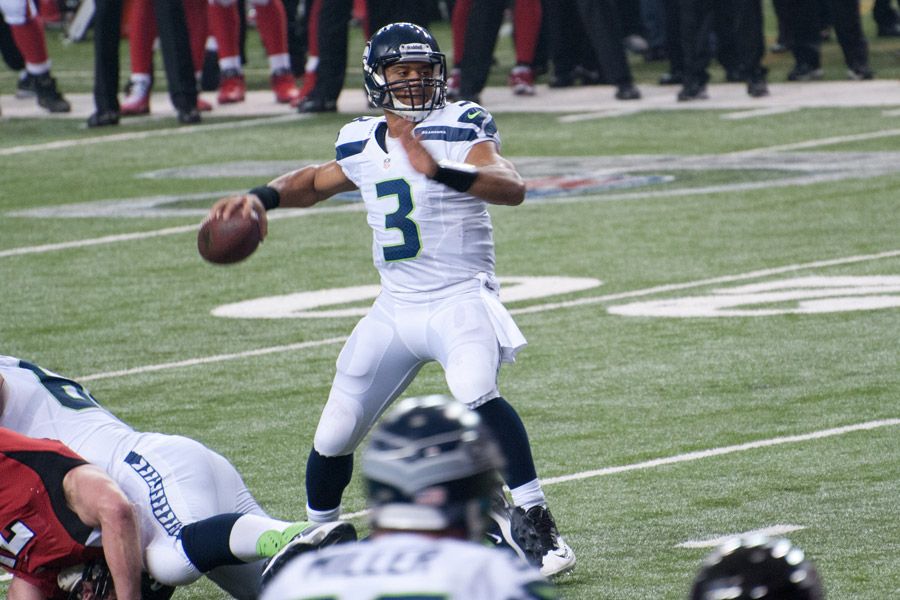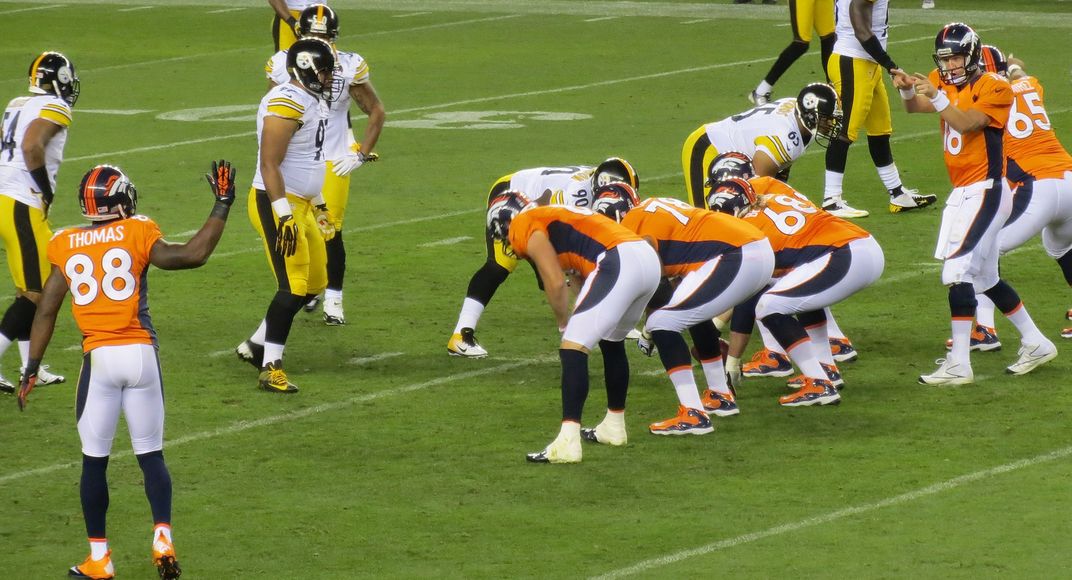The Science of the First Cold Weather Super Bowl
Science shows that the cold weather will make it harder for players to grip the ball, avoid slipping and hear each other over the roar of the crowd
/https://tf-cmsv2-smithsonianmag-media.s3.amazonaws.com/filer/79/71/79717ded-3722-4a5f-9cc9-8370e6e1d268/football_snow_2.jpg)
Currently, the forecast for East Rutherford, New Jersey, for Sunday evening is a low of 26°F, with a 10 percent chance of precipitation. East Rutherford, of course, is the site of Super Bowl XLVIII.
These weather conditions aren't particularly unusual for football games, especially during the playoffs, and both teams hail from cities (Denver and Seattle) that frequently experience rain and snow. But after 47 years of Super Bowls played in balmy locales like Miami, New Orleans or Tampa Bay—or domed stadiums farther North—this will be the first year that the championship game is played in wintry weather.
How will the game be impacted by the freezing temperatures and chance of snow? Scientists, of course, have the answer.

1. The ball will be harder to hold.
Many football players and fans believe that colder temperatures make the ball harder to grip firmly, leading to more fumbles. A recent scientific experiment at the Stevens Institute of Technology in New Jersey, conducted just in time for the game, suggests that this may indeed be true.
As part of the experiment, engineering professor Antonio Valdevit used sensors to measure the amount of force produced by the thumbs and middle fingers of several volunteers (including himself) when they held a football as tightly as possible at three different temperatures: 68, 41 and 4° F (for the cold temperatures, the balls were refrigerated or frozen and volunteers' hands were immersed in cold water or ice water).
Valdevit found that participants' thumbs generated the same amount of force in all three conditions, but their middle fingers were much weaker in the cold. Other experiments, conducted by ESPN, have shown that people who immerse their entire bodies in freezing temperatures (in a refrigerated truck) are able to grip with about half as much strength, because blood flow to their extremities is reduced to conserve warmth.
Sure, none of these experiment volunteers play for the Broncos or Seahawks—but the fact that they're not professional players doesn't mean the findings are totally irrelevant. "We can't say for certain fumbling or bobbling will increase in the game," Valdevit said in a press statement. "Players will likely adjust their grip under colder temperatures—reposition their fingers, wear gloves. But given what we found in one of the fingers, it's also possible the cold will have at least some effect."

2. The ball won't travel as far in the air.
Colder air means denser air—and that also means that the ball will generate detectably higher levels of drag as it moves through it, whether it's thrown, kicked or punted. Eric Goff, a physics professor at Lynchburg College in Virginia and author of Gold Medal Physics: The Science of Sports estimates that the cold temperatures in New Jersey will translate to about eight percent more drag than if the game were played in Miami.
On paper, this could have an especially big impact on Broncos quarterback Peyton Manning—who plays his home games a mile above sea level, with much thinner air—but like most players, he's experienced his fair share of cold weather games and has learned how to adjust. Still, the denser air could cap the distance he can throw the ball downfield.
For kickers and punters, this drag effect is compounded by the fact that cold footballs become under-inflated—in ESPN experiments (shown below), a football kept at 10°F for an hour had its air pressure reduced by 20 percent—which makes them less bouncy. As a result, they come off a kicker or punter's foot more slowly, and travel a shorter distance. The effect isn't enormous, but it's not negligible: In cold weather games, punts travel three fewer yards on average, and field goal accuracy drops by 1.7 percent.
3. Players will slip more often.
“In general, the friction coefficient associated with shoes and turf goes down as the temperature goes down. That means there is greater chance of sliding in the cold than on a warm field in Miami,” Eric Goff told Metro New York. He estimates that the friction coefficient could be reduced by 10 to 12 percent—again, compared to a game played in optimal conditions in Miami—which could contribute to both offensive and defensive players slipping more often.
Players will certainly adjust: Their equipment managers have prepped for many cold games and have a range of shoe and spike choices at their disposal. But players slip during every game, no matter what shoes they're wearing, and if you see it happen on Sunday, the cold, slippery turf may have been a factor.
4. Players might have more difficulty breathing.
Apart from numb fingers that can't grip the ball as well, prolonged exposure to cold can have other physiological effects on players, including making it more difficult to breathe, especially after a bout of sprinting.
“Breathing cold, dry air is an irritant to our lungs and to the lining of our lungs,” Tom Brickner, a physician for the University of North Carolina's sports teams, told the New York Times. “People will cough and feel like their chest is tighter. If you’re prone to asthma, that can be an issue, too.”
Of course, when they're on the sidelines, players can huddle next to heaters and don heavy coats, but switching back and forth between being active on the field and being inactive on the sidelines while the air is so cold could also take its toll on players' breathing ability.

5. It will be more difficult for players to hear each other.
A big part of any NFL team's offense is the use of audibles (when a quarterback changes a call right before a play by shouting at his teammates), and Manning in particular is legendary for his use of them on nearly every single play. Unfortunately, for Manning, colder, denser air doesn't conduct sound waves as readily—and as a result, it's estimated that sound travels through 70°F air about four percent more slowly than 30°F air.
This doesn't mean that Manning or Seahawks quarterback Russell Wilson will be rendered entirely silent, but it does mean that they might be slightly more difficult to hear over the roar of the crowd, potentially leading to more offensive miscommunications.
6. Players might feel the need to urinate while playing.
Brickner also told the Times about one of the most unexpected effects of playing in the cold. As players' bodies shunt blood away from their extremities and towards their core organs, their kidneys are likely to become engorged with blood. Their urinary systems may misinterpret this blood as evidence that they're over-hydrated and emit hormones to increase the rate of urination. Thus, even if the players are dehydrated—a frequent occurrence in the cold, when they're less motivated to drink water—they might feel the persistent need to urinate throughout the game.
Compared to flat footballs, numb fingers and slippery turf, the need to pee might not have as significant an effect on the actual outcome of the game. But if TV close-ups show you players looking particularly tense late in the game, though, this unusual nuance of the urinary system might in fact be the reason why.
/https://tf-cmsv2-smithsonianmag-media.s3.amazonaws.com/accounts/headshot/joseph-stromberg-240.jpg)


/https://tf-cmsv2-smithsonianmag-media.s3.amazonaws.com/accounts/headshot/joseph-stromberg-240.jpg)